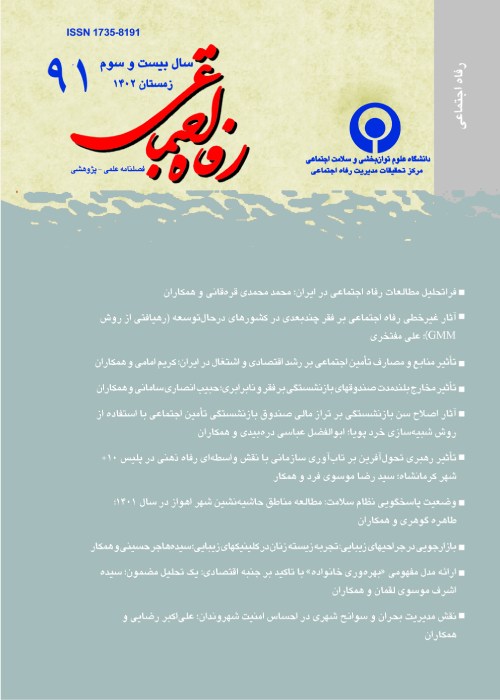Relation between Social Capital and Political Participation (Case Study: Qom Citizens)
Author(s):
Abstract:
Introduction
Desirable transition of contemporary society of Iran from traditional to modern order requires political participation of citizens. To achieve this participation, important prerequisites including social capital are required. In this regard, social capital is an important factor which determination of its role andeffects on political participation and activating its potential force are being considered in scientific communities recently. Recognition of social capital is important to provide political participation and to facilitate political development and promotion of democracy. Therefore, it has been assumed that social capital increases individuals potential of political action and increases the probability of their political engagement. Accordingly, present research examines the relation between social capital and political participation among citizens applying Robert Putnams theory. Method
Using a mixture of multi-stages cluster, systematic random and simple random sampling methods, 383 citizens aged 18-65 years old at city of Qom participated in this survey study.Findings: There was a positive relation between all components of social capital and political participation among Qom citizens. Although according to results of the multiple regression analysis, out of four predictor variables including social trust, social integration, knowledge and informal social participation, only two variables of knowledge and informal social participation had direct effect on political participation giving more weight to knowledge. However, results of the path analysis showed that all of these four variables had affected political participation of Qom citizens directly, indirectly and simultaneously (both direct and indirect). Knowledge, informal social participation, social trust and social solidarity had the most influence respectively. Therefore, citizens with higher political participation are those who have more knowledge, social trust, informal social participation and show more consistency with values and norms of the society.
Discussion
Although knowledge, social trust, informal social participation and social integration had effects on citizens political participation directly and indirectly,knowledge is the central part of social capital that increases citizens political participation while strengthening its other elements. In addition, considering mutual relations among elements of social capital, strengthening knowledge can positively influence other components of social capital such as social integration, social trust (especially institutional trust) and informal social participation. In fact, whatever knowledge element be more qualified, on-time and practical in public spheres (social-political), it will resulted to rising of citizens political participation at higher and more levels.Keywords:
Language:
Persian
Published:
Social Welfare Quarterly, Volume:16 Issue: 62, 2016
Pages:
359 to 391
magiran.com/p1666236
دانلود و مطالعه متن این مقاله با یکی از روشهای زیر امکان پذیر است:
اشتراک شخصی
با عضویت و پرداخت آنلاین حق اشتراک یکساله به مبلغ 1,390,000ريال میتوانید 70 عنوان مطلب دانلود کنید!
اشتراک سازمانی
به کتابخانه دانشگاه یا محل کار خود پیشنهاد کنید تا اشتراک سازمانی این پایگاه را برای دسترسی نامحدود همه کاربران به متن مطالب تهیه نمایند!
توجه!
- حق عضویت دریافتی صرف حمایت از نشریات عضو و نگهداری، تکمیل و توسعه مگیران میشود.
- پرداخت حق اشتراک و دانلود مقالات اجازه بازنشر آن در سایر رسانههای چاپی و دیجیتال را به کاربر نمیدهد.
دسترسی سراسری کاربران دانشگاه پیام نور!
اعضای هیئت علمی و دانشجویان دانشگاه پیام نور در سراسر کشور، در صورت ثبت نام با ایمیل دانشگاهی، تا پایان فروردین ماه 1403 به مقالات سایت دسترسی خواهند داشت!
In order to view content subscription is required
Personal subscription
Subscribe magiran.com for 70 € euros via PayPal and download 70 articles during a year.
Organization subscription
Please contact us to subscribe your university or library for unlimited access!


